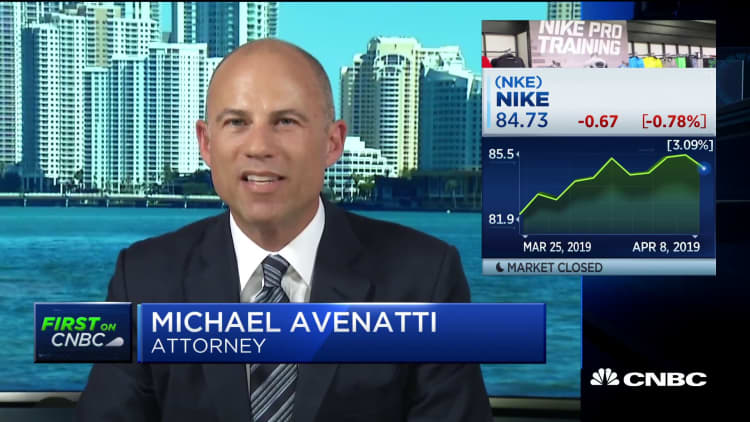Controversial lawyer Michael Avenatti searched the internet for the term "insider trading" and terms involving Nike stock options as he engaged in a scheme to shake down the athletic apparel giant for up to $25 million, federal prosecutors claim.
The searches back up a claim that Avenatti intended to profit from a drop in Nike's stock price "if he followed through on his threats" to publicize damaging claims about the company, prosecutors said.
Prosecutors said in a court filing that Avenatti searched for those terms "shortly" after a March 10, 2019, phone call with and an email from Jeffrey Auerbach, an advisor to a basketball coach who Avenatti has claimed secretly recorded conversations with Nike executives.
The filing, which detailed why prosecutors believe they are entitled to introduce evidence of Avenatti's web searches and other evidence, came on the eve of jury selection for Avenatti's extortion trial Monday in U.S. District Court in Manhattan.
Avenatti's lawyers have opposed introduction of the search terms as evidence, noting that there is no evidence that Avenatti engaged in insider trading.
Avenatti, 48, gained notoriety in 2018 with his representation of his then-client Stormy Daniels, a porn actress, in multiple cases involving President Donald Trump.
Avenatti was arrested last spring in three separate federal cases. In addition to the Nike case, he is accused of swindling Daniels out of $300,000 in book proceeds and of stealing millions of dollars from other clients.
Avenatti has pleaded not guilty in all three cases.
Two weeks ago, his release bond was revoked after federal prosecutors in California said he had committed new financial crimes while free on bail.
In the Nike case, Avenatti is accused of demanding as much as $25 million from the company in exchange for not going public with allegations by the coach, Gary Franklin, that the company made payments to top high school basketball players and their families.
In their court filing, prosecutors wrote that soon after his call with Auerbach, Avenatti "used his iPhone to search for 'nike.put options,' to visit the website 'Nasdaq.com — Nike Inc. (NKE) Option Chain,' and to search for 'insider trading," prosecutors wrote.

Put options are financial instruments that give their holder the right to sell a company's stock at a certain set price by a specific date, regardless of what price the stock actually is trading at on that date.
A holder of a put option earns a profit if the set price of the sale is greater than the actual trading price of the stock at the expiration date.
Avenatti was arrested in the Nike case two weeks after searching for the terms, during his visit to the offices of Nike's lawyers to discuss his demands, according to the company and prosecutors.
About 15 minutes before that meeting, Avenatti had tweeted that he would be disclosing a big high school and college basketball scandal "perpetrated by" Nike that he supposedly had uncovered.
Prosecutors in their filing wrote that "evidence of these searches and browsing history" before his arrest "is highly relevant."
"This conduct corroborates both the defendant's contemporaneous belief that he could use the stock price and his intent to use that information to benefit himself (by purchasing put options and thereafter causing Nike's stock to drop, or at least purchasing such options to so as to benefit personally if he followed through on his threats to make such information public," prosecutors wrote.
The filing argued that Avenatti's search "demonstrates that the defendant acted deliberately, and not rashly, and thus helps to show that he acted wrongly."


